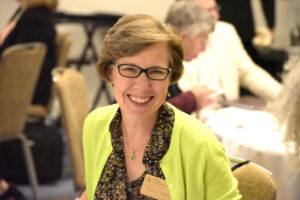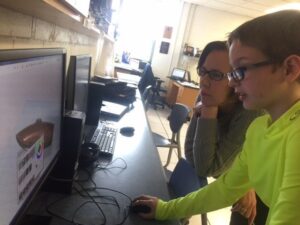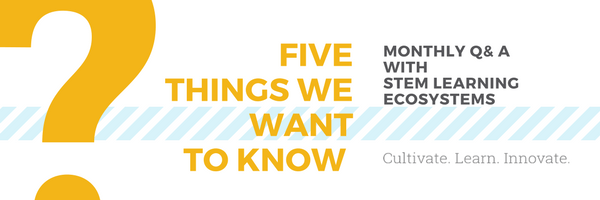 An Interview with Mary Adams, Greater Cincinnati STEM Collaborative
An Interview with Mary Adams, Greater Cincinnati STEM Collaborative
In this month’s newsletter, you’ll learn about the Next Lives Here: Social Change Innovation Summit and the Greater Cincinnati STEM Collaborative. Mary Adams is the Program Manager of GCSC. Learn a little more about GCSC and where Mary got her love of science and math.
What drew you to work in the STEM education field? What’s your background?
I’m an IT professional by trade and spent 27 years in corporate America. I was drawn to IT by the sheer fun of coding/programming; it’s like solving a puzzle! I’m drawn to STEM education and workforce development because of its importance to vibrant futures and careers (for people), vibrant communities (for people), and solving challenging problems in the world (for people).
Love that the Greater Cincinnati STEM Collaborative hosts a STEM Bicycle Club! How did that come about?
We love the STEM Bicycle Club, too! The club started in 2013 when our wonderful partner, Time Warner Cable, approached us with an innovation challenge. They’d been funding STEM programs for years and yet were looking for something new and exciting in the after-school, middle-school, with-community-partners space. We took that challenge, explored possibilities with the Urban League of Greater Southwestern Ohio, and agree to prototype a new program in collaboration with one of Cincinnati Public Schools’ high schools. Our friends at GE brought STEM and bicycle building expertise and our friends at a local Walmart helped us get the right bikes (30 of them, all identical!). We focused on building student STEM confidence while supporting students to have a FUN! Learning experience. That first year was a raging success and we codified the curriculum and other resources in year two. We’re now in the fourth year of the program, the region has more than 20 STEM Bicycle Clubs, and we’re partnering with an organization in Denver to help them re-apply the program there. The STEM Bicycle Club is on a roll!
What are GCSC’s Summer of STEM plans?

Summer of STEM began with small seed funds from the STEM Funders Network. This initiative is designed to 1) build community awareness about STEM education and workforce opportunities and 2) provide funding and other support for diverse, disadvantaged students to experience high-quality, fun STEM programming during the summer months. We’re proud to have grown the initiative from $5,000 in seeds funds in year one to a $200,000+ budget in year two. Summer of STEM is now supported by a variety of community organizations and individuals. Summer of STEM 2017 will engage more than 6,300 students, 525 family members, 475 educators, and 45 partners in STEM learning and opportunities exploration!
What else is going on at the GCSC?
I’d like to make a quick plug for the 3D Printers Club. We know that STEM sometimes doesn’t appeal to students because it sounds too academic or dry. Coding and designing, however, are cool – and 3D printing is downright hot! Students in 3D Printers Clubs learn about the design process. They design a solution to a small problem, such as getting lotion out of the bottom of bottles or keeping earbuds from tangling in pockets, and then actually 3D print the “product” they designed right in the classroom. We have ideas to extend the club even further; to make the 3D printer work even harder as an engaging math learning tool; stay tuned . . . more to come!
Who was a role model for you when you were younger? Favorite teacher?
My favorite teacher was my high school math teacher, Mrs. McBain. She was one of the very first African-American women to earn a college degree from Miami University in Oxford, Ohio, and she loved “beautiful mathematics.” She was the first person I knew to own a calculator. I remember the day she proudly showed it in our classroom; we were amazed (now we use smartphones as calculators!). I also remember how she would walk a piece of chalk around all the classroom blackboards and then throw it out the window to illustrate infinity. She used a variety other memorable actions and phrases to help us learn/understand math; she was energetic, passionate, and made math learning exciting. I was truly blessed to be in her classroom and she inspires me still.

